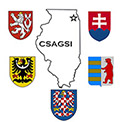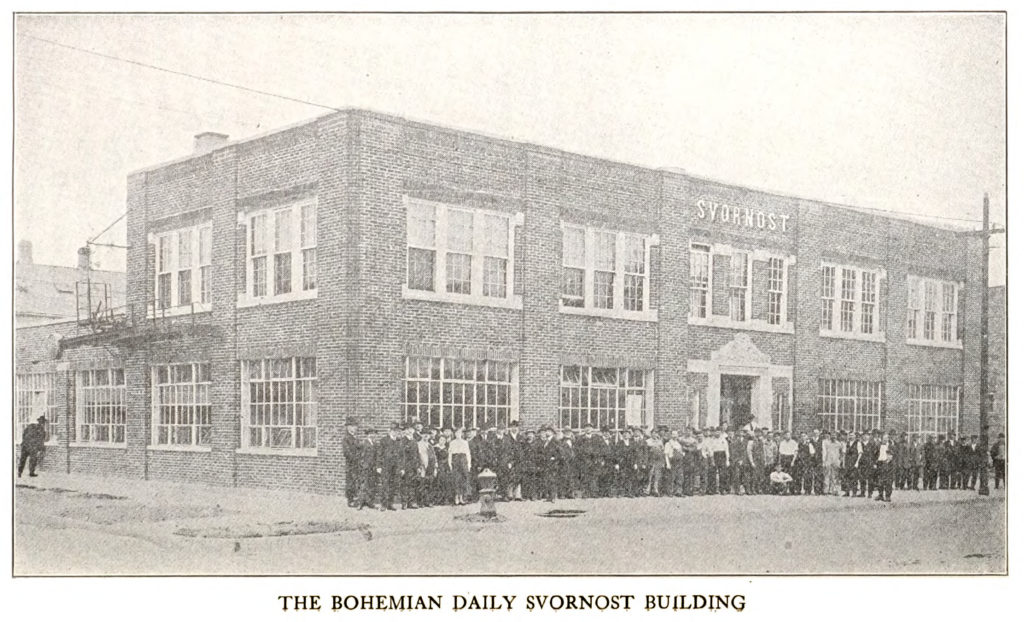August Geringer - Publisher
The December 2015 issue of KORENY, the Journal of the Czech and Slovak Genealogy Society of Illinois, published an article on August Geringer. Paul Nemecek, CSAGSI member, board member, and then, editor of the Koreny wrote the article. That original article is reprinted here in black text. New information which has been added is printed in blue text.
One of the most prominent people in early Czech Chicago, and the best known, at least by name, in all of Czech America was, and will remain, August Geringer, the publisher of Czech books and publisher of the oldest daily newspaper beyond the borders of Bohemia.

Image above: Birth listing for August Geringer
Mr. Geringer was born on August 2, 1842, in Breznice in the region of Pisek, the second of eleven children of teacher Vaclav Geringer and his wife Amalie, nee Baretta. His grandfather Antonin also taught in the public school in Breznice. When August was eleven years old, his father was transferred to a parish school in Technic, and after two years, at his request, the same kind of school in Lasovice. In addition to his teaching, Antonin earned a little money as a bookbinder, and August learned this trade from his father.
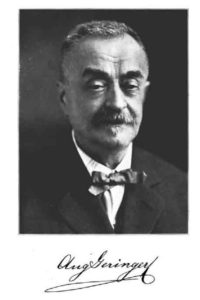 Leaving formal schooling August worked in Prague in a bookbindery, and after eighteen months he went to Vienna in order to perfect his trade. During the day he worked in a leather goods shop, later he worked on photograph albums, and evenings he helped in the furniture factory of the brother-in-law of his mother's sister, with whom he lived. In the factory he also kept business records and gained many kinds of business experience. He remained in Vienna until 1862, when he received a letter from home telling him he must go home to teach temporarily in place of his father, who had become ill. He worked as a substitute teacher for six years. At the same time he perfected his knowledge of bookbinding and the skills for working at a bookstore. (Image left from the Geringer Publication, Amerikan Kalendar 1923)
Leaving formal schooling August worked in Prague in a bookbindery, and after eighteen months he went to Vienna in order to perfect his trade. During the day he worked in a leather goods shop, later he worked on photograph albums, and evenings he helped in the furniture factory of the brother-in-law of his mother's sister, with whom he lived. In the factory he also kept business records and gained many kinds of business experience. He remained in Vienna until 1862, when he received a letter from home telling him he must go home to teach temporarily in place of his father, who had become ill. He worked as a substitute teacher for six years. At the same time he perfected his knowledge of bookbinding and the skills for working at a bookstore. (Image left from the Geringer Publication, Amerikan Kalendar 1923)
In 1868, during a vacation, he went on business to Prague and stopped on the way back in Milin where in a roadside tavern he became acquainted with Antonie (Antoinette) Kolar, the daughter of the tavern keeper. Visits went on for several months until finally on February 4, 1869, August and Antonie were married in the Lasovice church, the parish to which the bride belonged.

Image above: Antonie Kolar was born April 11, 1845 at Myslovice #14, Chrastany, Pribram.

Image above: Marriage of August Geringer to Antonie Kolar on 2-4-1869.
At this time August and his wife decided to move to America. He wrote to a musician living in Chicago, a musician who went to Chicago the year before, and asked about conditions and earnings. A reply soon came and it was enthusiastic. The reply emphasized bookbinding, a position to earn money in America. His friend also urged August to bring a lot of books and bookbinding equipment, a press, etc. August talked to his brother-in-law Frantisek Kolar, then in Vienna and he immediately offered to come also, as did his brother Antonin. It was decided they would go together. They went home to Milin, readied themselves and on June 20, 1869, traveled to Prague, then to Bremen, on to America, and came directly to Chicago.

Image above: Arrival of ship Weser from Port Bremen to Port New York City on July 10, 1869 – August Geringer 27, Antonia 24, Josef Kolar 26, Frantiska 22, Anton 23. (Note Josef Kolar and Frantiska are not verified as being directly related to Antonia and Anton.)
They reached the port of New York and immediately went through customs inspection. They quickly purchased railroad tickets and left in the afternoon on an immigrant train. Along the way they had to buy some bread, smoked meat and fruit, because on such trains there were no dining cars. The train trip took five full days, because the train often stopped and waited until some regular train rode through. In the state of Ohio they were attacked. Robbers shot at the train and they had to hide under the seats to avoid being wounded. This was our welcome to America. It was night time when they reached Chicago. On arriving in Chicago they were taken to an immigrant home to eat and to spend the night.
In the morning August left with his brother-in-law Frantisek to look for the family of Jan Syner, the musician in Chicago, who then lived on DeKoven Street near the church of St. Wenceslaus.
(The publication, Amerikan Narodni Kalendar, Volume 46, Year: 1923 Chicago, Illinois, an article translated by Dr. Mila Saskova-Pierce and Layne Pierce, and made available online, courtesy of Onward To Our Past, is an article on August Geringer. (You can read the article online at: http://onwardtoourpast.com/ank-article-translations/amerikan-narodni-kalendar-august-geringer-80-years-of-his-fruitful-life-1923.html) (You can also read the article in PDF format by Clicking This) In his own words, he recounts that his sister Anna, along with her brother Anton (Antonin) and her brother Frantisek were all present in Chicago during the day of the meeting with Jan Syner. There is an Ancestry posting of Frank Kolar arriving in 1869, but no record found so far. Frank lived and died in Chicago. (108415333). There were two Anna siblings born. One in 1831 and one in 1854.)
They found him and Mr. Syner loaned them sixty dollars, in those days a large sum of money. They were able to purchase needed furniture and through the help of a local resident, they found a house in which to live.
The word soon went around the neighborhood that a young fellow countryman from Bohemia had arrived who brought with him a lot of books and prayer books and other reading material. Soon August was selling these items and accumulated so much money in such a short time that he could pay off all his debts and set aside something for the future and for a store. August also continued to work at various bookbinding establishments.
Census 1870 Illinois, Cook, Chicago, Ward 9, and Page 90 744 ……
August Geringer 27, Antony 24, August 0
Below: 1871 Chicago Business Directory listing for August Geringer
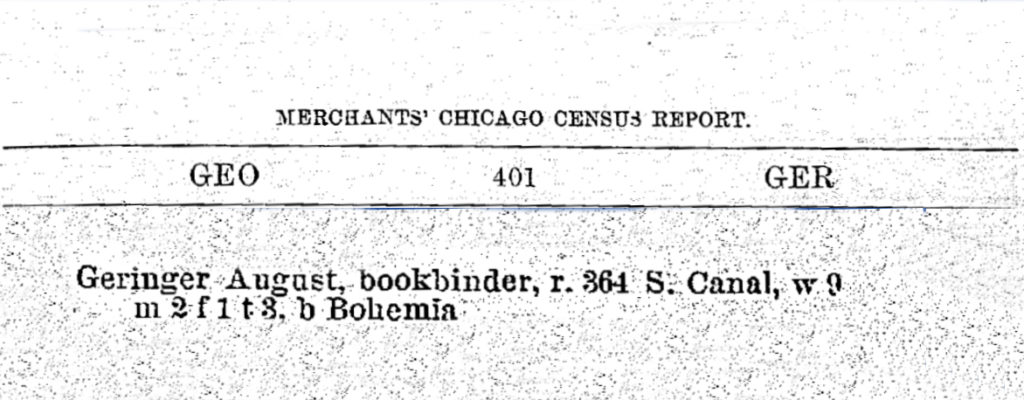
The Scientific Library at Olomouc’s 13th Annual Conference (11-23/24-2004) had a presentation on August Geringer – Publisher, benefactor and humanitarian, by Milena Secka.
Milena Secka presented information that Geringer not only was able to pay off his debts through the sale of the books he brought from Bohemia, he ordered Czech script from Bohemia, and began printing items for sale. Secka also noted that his wife, Antonie, earned extra money by cooking for several people. Secka also goes on to note that Geringer’s press was not destroyed in the 1871 Chicago Fire, so he gained much business right after the fire. Geringer joined with Josef Langmayer and with the extra income opened a larger printing house and published a four page magazine named the Chicago Journal. Geringer also published Czech language textbooks and Secka described Frank Zdrubek, in Omaha, Nebraska and editing the West Progress, coming to join Geringer and creating a picture reader for children.
Milena Secka continues her research presentation by describing that Geringer also opened a wallpaper shop, and helped put up wallpaper, along with this workers. By 1877 a Czech Sunday school was in operation and August Geringer became a volunteer teacher on Sunday afternoons.
(You can read Milena Secka's complete article in Czech here - https://www.vkol.cz/cs/aktivity/konference-a-odborna-setkani/13--rocnik-odborne-konference/clanek/august-geringer---nakladatel--mecenas-a-lidumil/) (You can also read a Google Translated version in PDF format by clicking this)
Life in a strange land was very difficult for new immigrants. The Austrian consulate was a place to be avoided. Mindful of these conditions, Geringer decided that there was a pressing need for a daily newspaper which would inform his countrymen in their native language about the new land, its laws and customs. Despite the fact that several earlier attempts at publishing a weekly had failed, Geringer, undaunted, dared to launch the Svornost newspaper, the first Czech daily in the United States. His friend and mainstay was Francis B. Zdrubek, who as editor greatly influenced his thinking and the policy of the paper. Zdrubek, a man of liberal ideals, combated clericalism and was one of the most active rationalists.
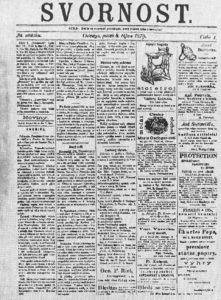 The first issue of Svornost (Concord) newspaper appeared on October 8, 1875. It had only 300 subscribers the first year. Savings were soon spent and debts were incurred which took years of determination and hard work to pay. Svornost survived the rough beginning and eventually grew and prospered with the influx of immigrants to whom it was more than a newspaper but rather an adviser and friend; there was a personal bond between publisher and subscriber.
The first issue of Svornost (Concord) newspaper appeared on October 8, 1875. It had only 300 subscribers the first year. Savings were soon spent and debts were incurred which took years of determination and hard work to pay. Svornost survived the rough beginning and eventually grew and prospered with the influx of immigrants to whom it was more than a newspaper but rather an adviser and friend; there was a personal bond between publisher and subscriber.
Soon a rich cultural life developed in neighborhoods built from scratch by the newcomers. No Czech community was ever a slum. It is to the Czech immigrants' credit that there was practically no crime in their communities and policemen were unnecessary.
The Svornost was influential in promoting fraternal organizations, loan associations, Czech banks, Sokol, Czech schools, the Bohemian Old People's Home and Orphanage, the Bohemian National Cemetery, Czech Beseda, etc. Geringer, himself a musician, gave full support in his newspapers to such organizations as the Lyra Singing Society; he sponsored the coming of the Ludvik theatrical company which played for many years in the Thalia Theater in the Pilsen neighborhood. There was tremendous activity in Czech communities at that time and the newspaper was its hub.
August Geringer, who became an American citizen in 1875, published a manual for immigrants on how to acquire citizenship, a Bohemian-English Dictionary, a Bohemian-English Letter Writer, the Bohemian-English Interpreter, and a history of the United States (in three volumes). There was a long line of various publications, such as the New Cook Book for the Czech-American housewife, The Age of Reason and other works by Thomas Paine, and several works by the great Czech journalist Karel Havlicek.
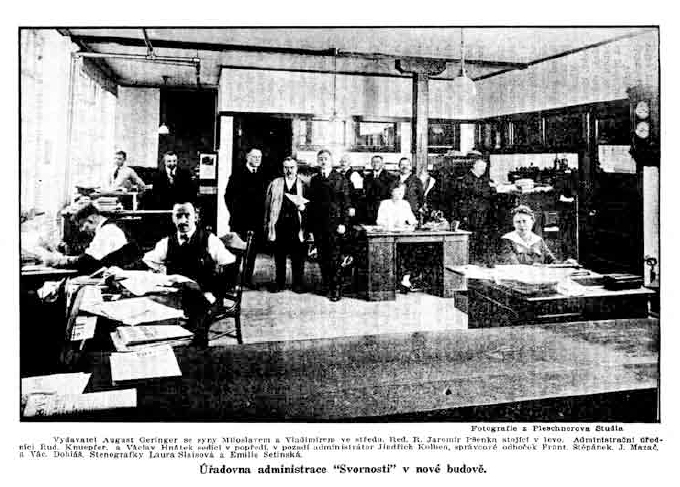 For immigrant-farmers, who pioneered in the Middle West, Geringer published bi-weeklies; Amerikan (in 1878), and later for the Newyorsky Vestnik, Alleghenske Listy, Oklahoma Noviny, Lowdky Vestnik. Later, Do-macnost and Slavie, the oldest Czech newspaper in America, were acquired from their former owners (1918). A humorist weekly Duch Casu first appeared in 1877. The annual calendar Amerikan, first published in 1878 (final issue appeared in 1958) became noted for its pioneer life stories which are an excellent record of the Czech in America in the past century. (Image Administration Svornost 1918, from Amerikan Narodni Kalendar 1918, found at University of Chicago online.)
For immigrant-farmers, who pioneered in the Middle West, Geringer published bi-weeklies; Amerikan (in 1878), and later for the Newyorsky Vestnik, Alleghenske Listy, Oklahoma Noviny, Lowdky Vestnik. Later, Do-macnost and Slavie, the oldest Czech newspaper in America, were acquired from their former owners (1918). A humorist weekly Duch Casu first appeared in 1877. The annual calendar Amerikan, first published in 1878 (final issue appeared in 1958) became noted for its pioneer life stories which are an excellent record of the Czech in America in the past century. (Image Administration Svornost 1918, from Amerikan Narodni Kalendar 1918, found at University of Chicago online.)
Census 1880 Illinois, Cook, Chicago, D89, Page 10, 463 Canal
August Geringer 38, Antonia 35, Miloslav 9, Vladimir 7, Vlasta 5
Census 1900 Illinois, Cook, Chicago, Ward 7, D179, Page 12 150 12th Street
August Geringer 55, Antonia 52, (7 Children, 4 Surviving), Miles 29, Vladimir 27, August 22, Vlasta Mraz (Vraz), Stanislaw Mraz 38, Emil Camsky (Nephew 20, Here 1898)
Census 1910 Illinois Cook Chicago Ward 9 D0512 Page 31 542 12th Street
August Geringer 67
Census 1910 Illinois Cook Chicago Ward 34D1984 Page 29 1608 Clifton Park Avenue
EST Vraz 50, Vlasta 34, Vlasta 34, Victor 6, A. Geringer (Antonia) 62
Antonia Kolar Geringer died on December 26, 1913. Death address listed as: 1817 S. Millard. Family Search has a listing for Antonia that mentions Montrose across the street from Bohemian National Cemetery, where husband August and several children are buried. Montrose Cemetery had a crematorium, while BNC did not. (Antonia Find A Grave 204763067) An article published by the Friends of the Bohemian National Cemetery lists that Antonia cremains are located with the Columbarium of the Bohemian National Cemetery, across the street from Montrose Cemetery.
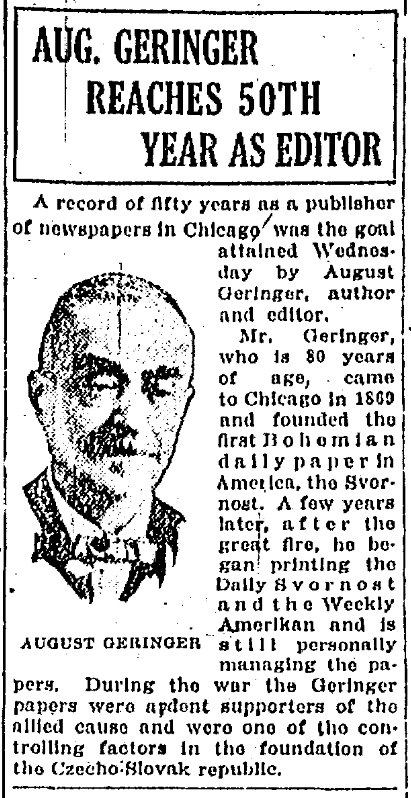 The Svornost, always critical of, and antagonistic to, the Austro-Hungarian monarchy, lost no time in joining the war movement for the self-determination of the Czechs and Slovaks the day World War I broke out in Europe. Its outstanding war service and leadership in the movement for Czechoslovakia's independence was recognized officially after the war by the first president Thomas Masaryk.
The Svornost, always critical of, and antagonistic to, the Austro-Hungarian monarchy, lost no time in joining the war movement for the self-determination of the Czechs and Slovaks the day World War I broke out in Europe. Its outstanding war service and leadership in the movement for Czechoslovakia's independence was recognized officially after the war by the first president Thomas Masaryk.
Census 1920 Illinois, Cook, Chicago, Ward 34, D2191 Page 4, 2520 Crawford
August Geringer 76
August Geringer died April 1, 1930. Death address listed as 2520 Crawford. August is buried in Bohemian National Cemetery (Find A Grave 204763131) Other family members are also buried in this cemetery.
Obituary – “August Geringer, publisher of the Daily Svornost, Bohemian language newspaper, which he founded in 1875, died yesterday at St. Anthony’s hospital, following an operation. Mr. Geringer, who was a native of Breznice, Czechoslovakia, was 87 years old. He came to Chicago in 1869 He is survived by two sons, Miles B. Geringer and Vladimir Geringer, both of whom are active in the publication of the paper and two daughters, Mrs. Vlasta Vraz of Prague, Czechoslovakia, and Mrs. August Psenka of Chicago. Funeral services will be held at 2 p.m. tomorrow at the Bohemian National Cemetery.”
August Geringer’s cremains are located in the Columbarium of the Bohemian National Cemetery, Chicago, Illinois.
When August Geringer died in 1930, Svornost became the Geringer Press Corp., with son Miles as treasurer, son Vladimir as president, and son-in-law R. J. Psenka as secretary and managing editor. The Svornost remained in the family for 71 years. In 1947 it changed hands and the new owners would continue until 1957.
August and Antonie Geringer had four children, Miles, Vladimir, Vlasta and Augusta.
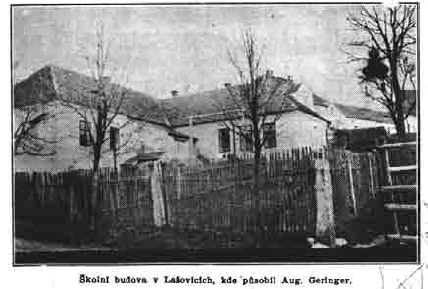
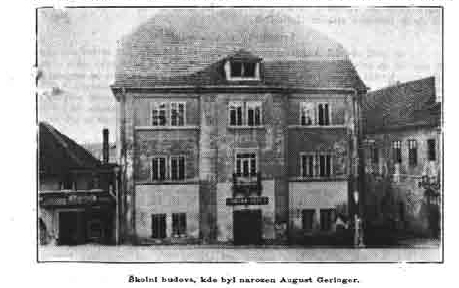
Surrounding images from the Geringer Press Publication of the 1923 Amerikan Kalendar.
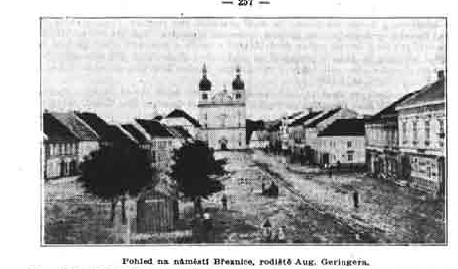
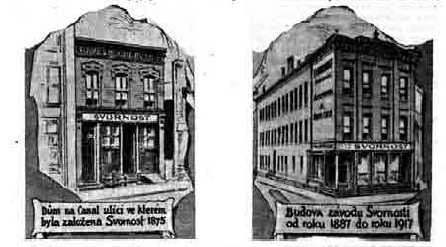
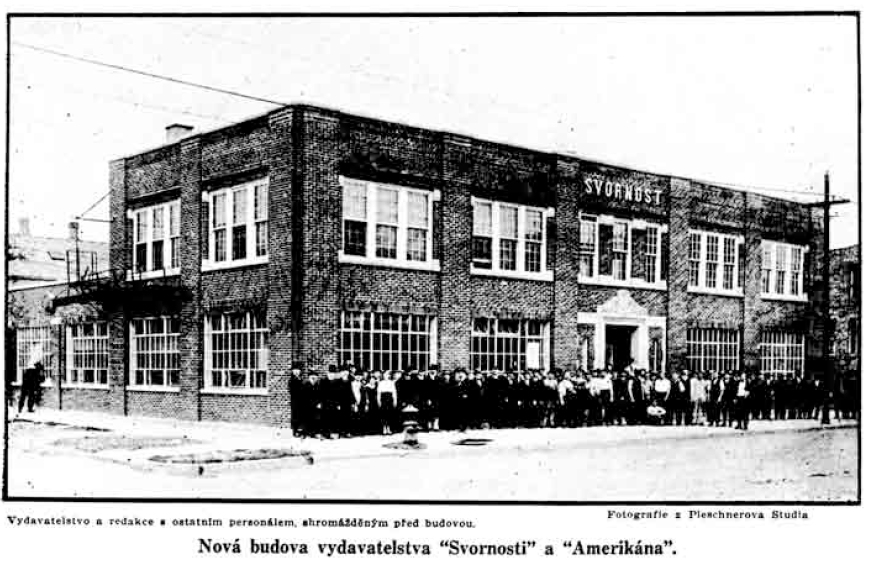
In his book, "Czechs won't get lost in the world, let alone in America", by Miloslav Rechcigl, Jr., Miloslav describes that Geringer built several buildings for his use, made and sold wall paper, imported and sold Czech books, published several hundred Czech books, and supported the Arts in Chicago. Building above, Svornhost building in 1918, published in the 1918 issue of the Kalendar.
Article from: The American Leader – July 12, 1917 – New York City
A Progressive Bohemian Paper - THE BOHEMIAN DAILY “SVORNOST OF CHICACO CELEBRATES ITS FORTY-SECOND BIRTHDAY IN ITS FINE NEW HOME
Among the thirty-odd racial stocks that combine to constitute the great cosmopolitan population of America, the Bohemians are one of the most desirable. There are few shirkers or lazybones among them. These qualities make for success and the Bohemians that come to America do succeed. Among the fifteen nationalities that come to us from Austria, the Bohemians have the lowest percentage of illiterates and the highest percentage of skilled laborers. No race prizes more highly the principles of democracy for which America stands or more readily adjusts itself to the conditions of American citizenship.
Chicago is the great Bohemian center of America; in fact, with its two hundred thousand Bohemian population, it is the second largest Bohemian city in the world. And it is doubtful if there is one of these Americans of Bohemian origins who cannot read and write. They thus constitute a solid and considerable contribution to the intelligence of the capital city of the Middle West, and in her business, activities are to be found everywhere, making a good showing.
It is but natural that, in the first months of their residence here, they should bridge the gap from the old conditions to the new with the assistance of newspapers in their own language, which keep them informed of the institutions, laws, and customs of the land of their adoption. Chicago has several such papers, some daily, some weekly. Among these is Denni Hlasatel, the daily Narod, Spravedlmost, and Svornost.
Svornost, a large, progressive, successful Bohemian daily, has just celebrated the forty-second anniversary of its founding in its fine new home. It is the oldest daily newspaper in Chicago
in point of continuity of publication by the founder. When August Geringer, founder of Svornost, settled in Chicago, in 1869, the city’s population was under 300,000. He has lived to see the city grow to second largest city on the continent. At the time of his arrival the Bohemians of the city numbered fewer than 3,000, while now there are more than 200,000 there. -
Svornost has always stood for unqualified loyalty to America, expounding its laws and teaching its history. Imbued with patriotism, the Bohemians of this country are ready to lay down their lives for the U. S. A., and of the first contingent of volunteers going to Jefferson Barracks, Missouri, fully one-third were Bohemians or of Bohemian extraction. The new home of Svormost is very properly situated in the heart of Chicago's Bohemian district, where 51 per cent. of the population are of that race. The building is of the modern factory type, faced with red pressed brick, with large windows and afinely carved stone entrance, done in the manner of the Italian Renaissance. While there is every modern device for the pro duction of a large daily newspaper installed in the building, the comfort of the employees has not been overlooked.
The elder Geringer is assisted in this big task by his two sons, Vladimir Geringer, managing editor, and Miles Geringer. We wish this newsy, progressive, American paper, published in Bohemian, continued success.
Jan Habenicht's 1904 book, appears in my opinion, to have a favorable review of the Catholic Church and all of its participants. But a rather dim view of Free Thinkers. Frantisek Zdrubek and August Geringer are described differently in Havenicht's book. But August Geringer's brother John remained Catholic and is portrayed in a different light.
Dejiny Cechuv Americkych (The History of the Bohemia of America)
Writer
Jan Habenicht
S Mnohymi Obrazy (With Many Images)
V St. Louis Mo. (In Saint Louis, Missouri)
Tiskem A Nakladem Casopisu,. Hlas PRINT AND LOAD OF MAGAZINE REPORT
Veslera Prava Vyhrazena Rights Reserved
1904
Translation of pages by Google Translate – Decent work, you will get a sense of the article.
Pages 578 – 579
August Geringer was born on August 2, 1842, in Beznice, in the Písek region.
He received a middle school education and later learned the art of bookwashing.
He arrived in Chicago on 18 July 1869 and brought the necessary ones with him
tools for bookbinding and some Czech books. He first set up De Koven and later on Canal Street (between Polk and Mather), which was then the main one Czech shopping street, a small bookstore and a tiny bookwashing plant. Year 1871. Affiliated with Ek Duras (who then lived in Wilber, Nebr.), And both founded at 490, on the south Canal Street, a larger bookstore and a small printer. Geringer he bound books for Czech societies and German booksellers. On Sunday and on consecrated holidays, he used to go to the Church of Sts. Wenceslas Square on the corner of De Koven and Desplaines play in worship on the violin. When then built it was at 25. St. John of Nep. In May 1872, both the companions —Geringer and Duras — had their business moved to number 449th on South Canal Street, but soon after they broke up. Geringer he kept a bookstore, and Duras took the printer, who soon began publishing magazine "Battalion of Liberty." But after six months he stopped and went to Crete,in Nebraska.
After his departure Geringer got together with Josef Langmayer, right from St. Louis to Chicago, and gave him a new printing press, published the "Chigago Journal," directed by John A. Oliverius. The "gazette" was by letter only and given to the audience free of charge; the expenses, with the publication of its associated, were covered by the announcements. After six months, however the companions parted, and the letter remained to Langmayer. In the spring of 1875, he grew up Geringer do. 463th South Canal Street and began to publish weekly "American" and the first Czech daily in the United States "Svornost '," whose first issue was 8. October 1875.
František Bol was the editor of "Svornosti" at the beginning. Zdrbek himself; the administration's work then performed by Geringer.
In May 1876. Geringer embarked on publishing humoristic and anti-religious
picture magazine "Raráška"; editing his ml in charge today the late Gustav B. Reišl, who also helped Zdrbek. On 8 July 1877. "Rarášek" came out enlarged, nicknamed "The Spirit of Asu" and given to "Svornost" for the Sunday attachment. In 1886. Geringer moved to a new house on the corner of 12th and Clinton streets and supported by some of his friends, he arranged there a large printer, which has progressed over time, and now has $ 20,000 prices. The house where the printer is is his property. Besides, he arranged a bookstore, published and sold various books, bloody and sensational novels, easier and anti-religious writings.-
Regarding his personal and business character, we note the following: AugustGeringer is a diligent, enterprising, persistent, ruthless trader and the only one, and only his benefit to the mindful. People who worked for him as he wanted it, he paid a decent wage. This is all. However, once some of his roots got out of his race and in some way, especially then competitive, he was a defect, he immediately became the worst enemy. Geringer used to be a great master and considerable power among his compatriots, which, however, must be attributed to the influence of his journal: "Svornosti," "American" and "Spirit of time." Indeed, his letters were "influential" at a time when our countrymen did it they feared that they would not be disgraced in the public letter (they have become accustomed to it today and laugh ), and Geringer used this power of the press not only non-civil, but sometimes only inhuman. Anyone who had become uncomfortable to him was attacked in a raw way, not his personal journey 'and mock the trophy of his compatriots, who he was not often worthy to untie the straps of their shoes.
Furthermore, Geringer is also one of the great causes of the disparate social relations between American guilds. It was his leaves, which on every occasion looted articles, shameful, fellow countrymen. In his letters, Geringer called them names that I couldn't even hear in the company of the bad guys and the non-outsiders, bothered against their own companions, damaging them in trade and metal in the face of the names of the inferior breed! Geringer poured grudges into the fires of the expatriate hatred, and forgotten every national and blood bond. He didn't care - only when he had his own revenge.
Furthermore, Geringer completely spoiled the good taste of our people in the cause of the literature by the fact that in his greedy and "free-minded" sheets he used to punch such nasty and so moral rot-smelling bleeds that man, having just a little tastes, marveles and thorns and wonders how anyone — who pretends to pretend to be a leader of the Czech people in Chicago and a hunter who boasts of his purpose
It is to educate the Czech people — to submit something like this for many years to be mental of the people of the Czech-American people. In addition, it was written in his letters in a way "spicy" and mocking about people, uncomfortable to him, and everything it is against his mind, written there in a rude manner. "Freedom" people now only loves this salty and overcooked diet and enjoys reading, people disgraceful, scandalous and woeful. The consequence is that eventually good Czech leaf does not find among the echoes in America soil and life or soon.
Geringer has always sought to rip God's faith in the Czech people in America, that has bothered him in hard times, and has given him a replacement for the doctrines of at the same time disdaining him of "prejudices" by the national. And his "work" and "effort" his were not futile, and their effects among the Czech people today are noticeable. Today's American guild, so bred, forgets its beautiful Czech homeland, and so far it has come that many eat and curse that it had every noon on the table full of pots of meat, as in the case of America, where often not by his own cause, but by mistake of fate he obtained the known name. Perhaps this interesting episode will contribute to knowing the character of Geringer from his life.
In May 1891. editor of "Svornosti" Karel Stulík, who is now in Chicago operates a medical practice, Geringer left and reported to the editor of "Daily Announcers, "that A. Geringer did not send to the guilds of pensions collected both on the Hus Memorial, and on behalf of the compatriot, the fatal flood affected," The Daily Announcer "published it and called Geringer several times to apologize for the accusation. the accusation repeated this again in June, then written to Prague. In July she came directly to the money collecting committee, saying that Geringer had not sent any money. This letter was photographed, and his picture published in "The Announcer". After that she called "Gymnastics Unity The Falcon "to his hall on Taylor Street (it was August 3, 1891.) scuhzi and challenged A. Geringer, would attend the meeting and explain why he did not send the pension to the guild in time.
The thing was as follows: The collection for expatriates in the guilds of the flood plagued, ended "Svornost '" on January 19, 1891, but the money came to Prague only on July 7; collection at Hus Memorial monument ended with "Svornosti" on March 22, 1890. and money arrived in Prague on June 17, 1891.
The plaintiffs (Karel Stulik and the publisher of the "Daily Announcer") Geringer
in particular, they complained that he had withheld the money because he would trade them. Geringer then claimed that he did not use the pension in the shop, but that it was deposited with the bank. Besides that pension for those affected by the flood did not send in as because many who promised to contribute, with the promised sums were delayed. He did not send money to the monument to Husuv because he was not sure whether the monument would be built. After such a statement, there was an incurable vagueness, and Geringer had to leave the network under the protection of his friends; the people threatened him with lynxing. —L soon the rippling levels of public mine had calmed down, and Geringer worked in a way and continues to work to this day. The only difference is that he grew to be the "widow" of the Czech people, and the method of his "work" is the same, which was revealed in a certain strike in Chicago, in which copies of "Svornosti" he was horrible for the rights of the striking brotherhood, but in the specimens intended for the companies that hired the strike, he published announcements by which the strikers were hired. In another fraudulent way, he dealt with Severa Co., Cedar Rapids, etc. If we are to sum up the activities of August Geringer, we must admit that that he worked enough and enough, that he evil enough and enough, but positive and used he did not do much. He has published enough books, but most of the worthless books, like she, secretary of love, homemade cookbooks, bloody or sensan a novel, a book for school children, on whom they are attached and bound in the book The prospectuses advised women's books dealing with the treatment of venereal diseases illness etc. His activity deserves a true condemnation and has proven it when Czech nationality in the United States did something good, he did it unwittingly, or profit.
The 1931 publication of Geringer's Amerikan contained a very comprehensive summary of August Geringer. It is available below (courtesy of Google Translate - Decent Job) in PDF Format.
https://www.friendsofbnc.org/newsletters/vol8no4.pdf - Stories of the Stones – Article on August Geringer, images, and burial location within Bohemian National Cemetery. Friends of the BNC newsletter.
Geringer family papers, 1842-1986 - https://explore.chicagocollections.org/marcxml/chicagohistory/31/h98zj92/
Collection summary Correspondence, newspaper clippings, travel documents, and other papers, some written in Czech, of August Geringer, Rudolph Jaromir Psenka, Vlasta Adele Vraz, and Victor Edgar Vraz. Included are Geringer's birth and baptismal certificates and numerous clippings from Czech publications, likely including the Chicago Daily Svornost, which he founded in 1875. R. Jaromir Psenka papers include documents from the Smetana Singing Society, Bohemian Arts Club, and French Foreign Legion as well as his speech transcripts and miscellaneous writings. Vlasta Vraz papers include documents from the American and the Czechoslovak Red Cross, the Voice of America Czechoslovak Service, and Radio Free Europe, in addition to transcripts of her speeches. Victor E. Vraz's papers are comprised of his writings while at the School of Commerce, Northwestern University.
